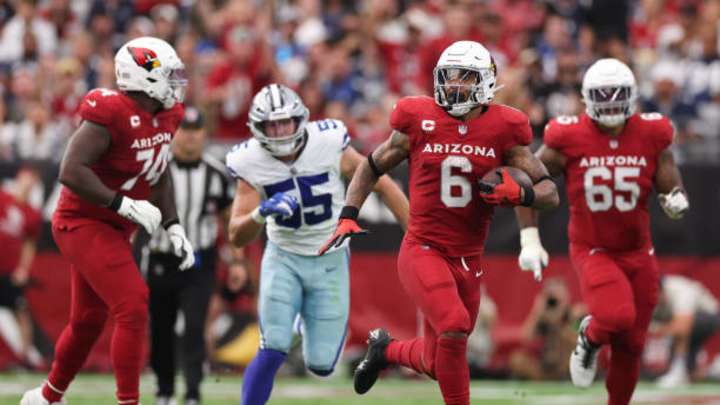'Bad Football!' Dallas Cowboys Big Defensive Flaw Revealed by Cardinals in Upset

In this story:
The Dallas Cowboys (2-1) suffered a shocking 28-16 defeat Sunday at the hands of the Arizona Cardinals (1-2) inside State Farm Stadium ... and may have had the blueprint leaked on how to create similar results moving forward.
Entering as 11-point favorites after a pair of dominant victories to start the season, Dallas barely looked the part, trailing 21-10 at halftime while Arizona racked up more rushing yards in 30 minutes (180) than the Cowboys had allowed all season (172).
The second half wasn't as volatile, as the Cardinals took 15 carries for 42 yards ... but they still finished the game with 222 rushing yards, the most an opponent has put on Dallas since the Chicago Bears recorded 240 yards on the ground in Week 8 last season.
Adjustments were made, but it proved too little, too late ... and Cowboys coach Mike McCarthy now has his hands full correcting the run defense, because the rest of the league surely took note of how to beat Dallas' defense.
“I think it was clear from the start that they were going to test the middle of our run defense," McCarthy said. "It’s something we have to be better at and we know that’s going to be the challenge.”
The question now becomes why the Cowboys struggled containing the Cardinals' rushing attack, which recorded 247 yards total through the first two weeks.
Cowboys defensive tackle Johnathan Hankins, one of the players directly involved in "the middle of our run defense," provided his thoughts postgame.
“I just think we weren’t locked in, all 11," Hankins said. "We just weren’t on the same page, Arizona did a good job capitalizing— getting us not being where we need to be. They definitely got us too many times.”
When the Cowboys are defending the run well, they have strong gap discipline, Hankins said ... before adding that Dallas didn't have any on Sunday while being punched in the face by Arizona.
Beyond the Cowboys' lack of focus, which could've come from the adversity McCarthy mentioned they faced throughout the week after several injuries, the Cardinals simply identified what they perceived to be a weakness - the middle of Dallas' defense - and attacked it ... time and time again.
“They ran a lot of pull schemes, got downhill and didn’t really attack us on the edge," safety Jayron Kearse said. "It was just a lot of downhill running with a lot of pull schemes. Getting their linemen on our edge guys. We’ll know more when we watch the film, but we weren’t good enough.
“It was just bad.”
Kearse added that he won't fully know exactly why the Cowboys couldn't contain the run early until he watches the film, but when combining his conceptual analysis with McCarthy's concerns, the idea grows clear: the middle of Dallas' defense has considerable room to improve.
What's particularly concerning is the Cowboys were aware that Arizona, which started journeyman Josh Dobbs at quarterback, was going to bring a physical, run-heavy approach.
And yet, Dallas couldn't stop it - at least not until the number neared almost 200 total rushing yards.
“We definitely knew what kind of game it was going to be," Kearse said. "They just came out and their will was stronger than ours. It showed throughout the game. Like I said, I don’t have many words - it was just bad. We were just bad, and we didn’t help our offense enough.
"I don’t know what to really say, it was just bad football on our part.”
Now, the Cowboys are tasked with re-grouping before Sunday's home game against the New England Patriots, who are coming off a 15-10 victory over the New York Jets in which they ran for 157 yards.
Dallas knows it's much better than how it played in Glendale - after all, the first two weeks proved as much - but the secret appears to be out on how to handle the Cowboys' defense, making the next adjustments all the more crucial to the team's eventual fate.
“When you get into the situational stuff and how we feel teams are going to attack us, we have to learn from this because it is going to be an every week challenge,” McCarthy said.

Daniel Flick is an accredited NFL writer for Sports Illustrated's FanNation. Daniel has provided boots-on-ground coverage at the NFL Combine and from the Atlanta Falcons' headquarters, among other destinations, and contributed to the annual Lindy's Sports Magazine ahead of the 2023 offseason. Daniel is a co-host on the 404TheFalcon podcast and previously wrote for the Around the Block Network and Georgia Sports Hospitality Media.
Follow ByDanielFlick